#nine muses of ancient greece
Photo
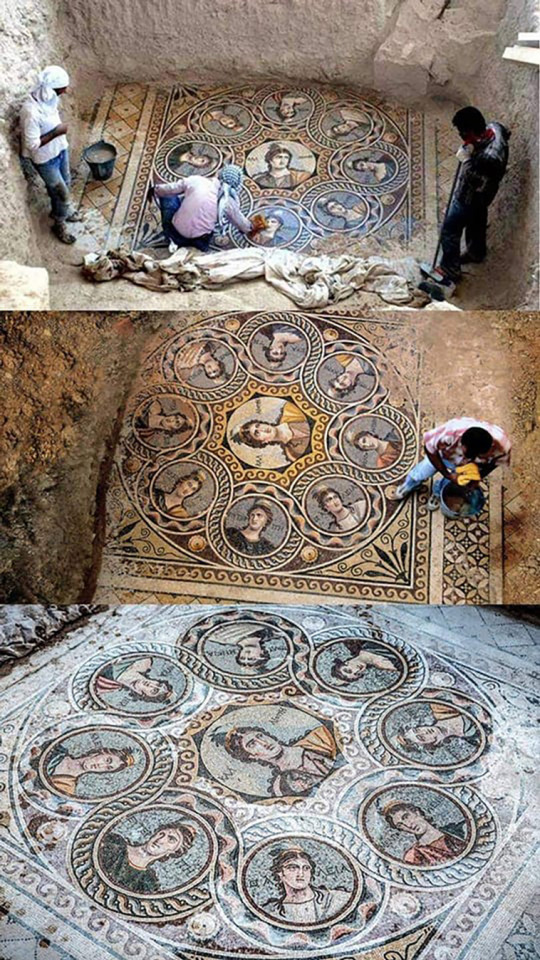
The nine muses of Ancient Greece discovered in the ancient Greek city of Zeugma, now in modern-day Turkey. The mosaics have been almost perfectly preserved for over 2,000 years
4K notes
·
View notes
Text
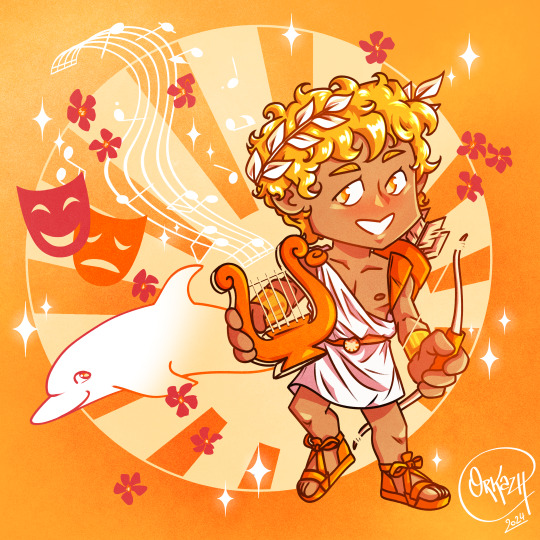
[🏺Greek Gods Series - #2✨]
☀️🏹Apollo, God of Oracles, Healing, Archery, Music & the Arts 🎵 🎭
#apollo#greek mythology#greek myth#greek gods#greek god#greek myth art#ancient greece#chibi art#chibi greek gods#greek pantheon#the 12 olympians#olympus#polytheism#hellenic polytheism#hellenic pagan#hellenic deities#delphi#muses#nine muses
210 notes
·
View notes
Text
why is hades better?
I love how hades is supposed to embody death and all the negative things in the world and is supposed to be this evil monster who tortures heroes and is a overall weird gloomy underworld dude who is surrounded by death. But people prefer him over zeus and poseidon for one simple reason :
he is loyal to his wife and he loves her.
#I love hades#that man is an icon#fuck zeus#greek gods#zeus is a dick#greek mythology#greek god#zeus#hera#aphrodite#hephaestus#ares#dionysos#nine muses#hermes#hestia#athena#artemis#percy jackson#ancient greece#ancient rome#dionysus
30 notes
·
View notes
Text
Apollo & the Muses
The god of sun, light, music, poetry, and art: Artemis’s twin Apollo! I’m sure that most people are aware that these are the things he is most well known for, especially when it comes to the sun and light, but did you know he was also a god of deadly plagues, prophecy, and archery? After his mother was cursed by Hera due to Zeus having yet another affair, Leto was forced to birth him on the island of Delos since it didn’t connect to any main lands. He is a god with an athletic and youthful build, meaning he doesn’t sport any facial hair (or has very little). He has another name, referred to as his forename, and that name is Phoebus after his grandmother, Phoebe, who was a titan. Though his name is the same in both Greek and Roman mythology, the things he rules over have different focuses; for example, in Roman mythology, it’s emphasized that he is the god of healing and prophecy whereas in Greek mythology he’s the god of sun and light. As mentioned in the beginning of this post, Apollo could bring deadly plagues just as much as he could heal people; in fact, there’s a story where he plagued Greek bases during the Trojan war, a war in which he also killed Achilles. Apollo was a highly praised god who brought great amounts of joy to Olympus through music and magic which he engaged in with his friends, the muses. The muses were nine goddesses known for their inspirational art and music that also judged certain competitions involving Apollo. There was one such competition where a mortal claimed to be more musically inclined than Apollo, so he was challenged and lost when the muses declared Apollo more gifted. This resulted in the mortal, a satyr named Marsyas, in being skinned alive as punishment; his skin was then nailed to a pine tree. Another fact about Apollo is that Hermes is his half brother, and the music Apollo plays, is played on a lyre made for him by Hermes. The lyre is one of Apollo’s many symbols; his others include animals such as dolphins and swan, plants such as the laurel tree (which became a status symbol), bow and arrow, and the sun! He also had many offspring, the most well known being Asclepius and Orpheus, and a romantic relationship with a nymph named Daphne. After being hit with an arrow from zeros (Cupid), Apollo fell in love with a Nymph named Daphne, who I’ll elaborate on in another post. His son Orpheus inherited Apollo’s music skills, while Asclepius had his skills of healing and medicine which were taught to man. Something else Apollo is known for is killing the cyclops who made Zeus’s thunderbolts in retaliation to Zeus killing his son, Asclepius. Dating back to 5th century BC, it is said that Apollo is closely linked with Nyx’s son, Helios, but that’s as far back as that relation goes. He was a major inspiration to many Greeks and Romans; so much so, a mortal ruler named Octavian claimed Apollo as a patron and had a temple constructed for and dedicated to him. Speaking of temples, Naxos is a sacred site of Apollo’s, where the massive doorway of a once great temple may still stand!
-
Sources:
Greekgodsandgoddesses.net
Worldhistory.org/apollo
thecollector.com
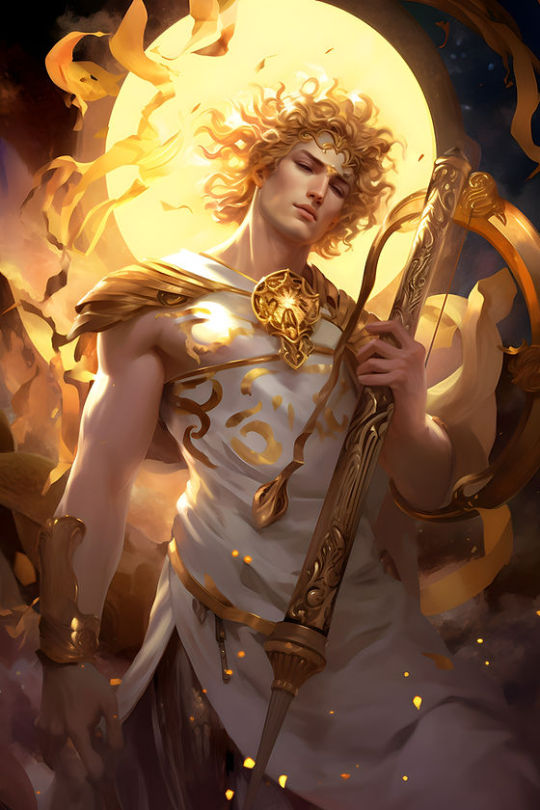
1 note
·
View note
Text
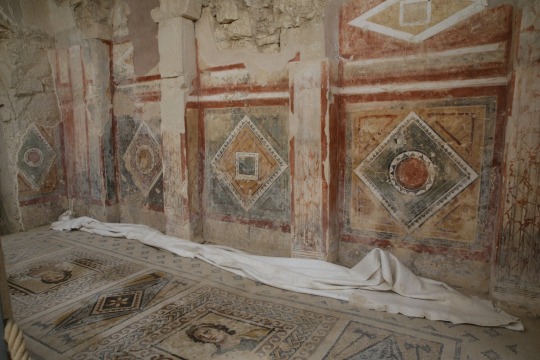
Roman domus known as ' House of Muses", Türkiye.
Photos and text from DAILY SABAH - ANADOLU AGENCY
The House of Muses, discovered in the ancient city of Zeugma in the Nizip district of southeastern Gaziantep province during excavations carried out since 2007, is one of the most important examples of Roman residences in the historical site with its rich architectural decoration, well-preserved mosaics and frescoes.
Zeugma is home to Roman houses, believed to belong to nobles, dating back to the second and third century B.C
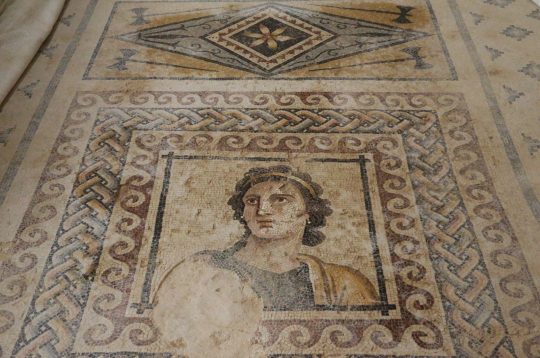
The ancient city’s House of Muses, which was unearthed after 14 years of excavations, was named after a mosaic on its floor depicting the nine muses of ancient Greece, who, according to legend, rule over the arts and sciences and inspire those who pursue them.
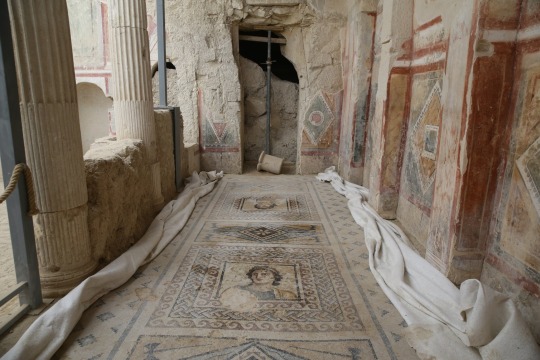
The Zeugma Mosaic Museum, one of the world's largest mosaic museums, is home to unique ancient artifacts, such as mosaics, Roman-era fountains, a bronze sculpture of Mars – the god of war in Roman mythology – and the famed Gypsy Girl.
Article published on August, 17, 2021 - DAILY SABAH
277 notes
·
View notes
Text
⋆.˚ ᡣ𐭩 .𖥔˚ The Nine Muses ⋆.˚ ᡣ𐭩 .𖥔˚
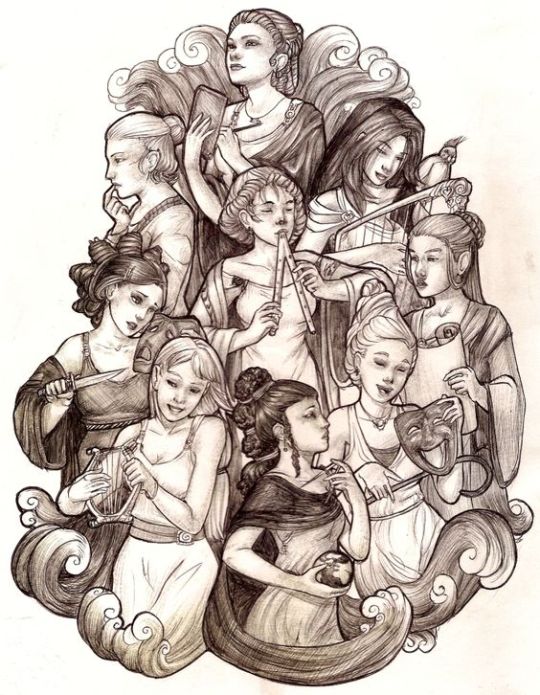
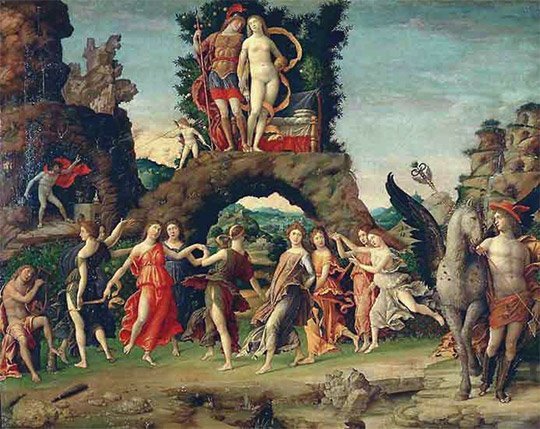
In Greek mythology, there is a group of nine goddesses called the muses. They are responsible for inspiring artists, poets, and writers. The word muse comes from the Greek word "mosis", which means wish or desire. The word museum also comes from the word "muses".
The myth of their creation is that Zeus (disguising himself as a Sheppard), slept with Mnemosyne for nine nights in a row, producing nine sisters. Mnemosyne gave her daughters to Eufime and Apollo, who raised them with a great fondness of the arts.
The nine muses were:
Clio - Created the study of history and guitar. She was a goddess of creativity. Her role was mostly to attend political meetings. In ancient Greece, history was called "clio" or "kleos". Often depicted with a book. She was also the goddess of memory.
Euterpe - Created many types of musical instruments, is often depicted playing a flute, while being surrounded by several other instruments. She is also usually associated with drums, violin, and guitar. The flute is her specialty.
Thalia - She discovered comedy and humor, which she was also protector of. Also discovered geometry and agriculture. She was depicted holding a comedy mask. She is a joyful young woman, almost always laughing.
Melpomene - She was the creator and protector of tragedy (opposite of Thalia). She was depicted with a tragedy mask and bearing a bat. She is the Greek goddess of theatre, along with Thalia. She is the mother of mermaids. She is know to have anything a woman could desire, except happiness.
Terpsichore - She is the muse of poetry and dancing. She is also known as the mother of sirens. She was the protector of dancing and loved music. Invented the harp. Also invented education. She loves having fun and being happy. She is depicted as a young woman wearing laurels on her head, with a harp, or dancing.
Erato - Protector of love, love poetry, and also marriage and weddings. Her name comes from "Eros" which is the feeling of falling in love. She is depicted with a lyre and love arrows + bow. She is associated with roses, myrtle, and turtle doves.
Polymnia - Protector of divine hymns and mimic art. Invent geometry and grammar. She is often in meditation or a pensive state. Depicted looking to the sky holding a lyre. She created harmony as well. She is associated with the colour white.
Urania - Protector of celestial objects. Such as stars and planets. She invented astronomy. She is depicted bearing stars, a celestial sphere, and a bow compass. The planet was named after her as well as the Greek god.
Calliope - She was the oldest and most superior muse. Her role was so accompany kings to serve justice and peace. Protector of heroic poems. She is depicted holding laurels or a trumpet in one hand and Homeric poems in the other hand. She is also ruler of epic poetry. She taught Achilles how to sing and is known for her beautiful voice.
The nine muses have been inspiring artists for centuries.
αποχαιρετισμός! ♡

24 notes
·
View notes
Note
I mean Hephaestus is an incel if you consider the myth of him sexually assaulting Athena soon after he got divorced. But he's not the only incel.
Talking about that dialogue I found it funny once you remove Hermes' line about Hephaestus being a cripple. Them talking about how unlucky they are in love is so funny. Ik outside of Lucian's verse they'd had a lot of lovers (Apollo has all the nine Muses for god's sake) but let me have this!
Lucian says Aglaia was his wife in Lemnos and Aphrodite was his wife in heaven. So it could be that Aphrodite doesn't know about Aglaia. Or that Hephaestus keeps it separate (unlike Aphrodite who slept with her lover in her and Hephaestus' bed) and so she doesn't mind.
There's a rather wholesome dialogue between Apollo and Hephaestus in the forge before this one, where he warns Hephaestus to look out for baby Hermes who's going around stealing other people's stuff. Which again makes me think that Apollo's never seen this dude outside the forge and that's why he thinks Hephaestus is always sweaty and sooty and goes to bed like that lmaoo
Yeah like the only myth where he is an incel is with Athena (darn shame too bc their friendship was probably sweet af)
It’s amusing how Apollo and Hermes complain about having zero game bc in Lucian’s Dialogues it’s mentioned that Eros never bothers the muses with his arrows which doesn’t really make sense bc in other sources they were Apollo’s lovers and had other lovers beside him. Weird.
Aglaia and Aphrodite being married to Hephaestus at the same time is probably a translation error, like every time I read a bit of the Dionysiaca it calls Zeus’s affairs “marriages”. It’s interesting how it’s pointed out that they are kept separate and that’s why they don’t mind each other, like in Ancient Greece married women were expected to accept their husbands affairs but maybe even then there are still boundaries that shouldn’t be crossed like not sleeping with your lover in your house and marital bed bc wtf Aphrodite even Zeus doesn’t have the audacity.
Also Apollo being friendly to Hephaestus and then talking smack behind his back really sucks. I like to think that Hephaestus is hygienic normally but bc he’s always getting commissions from the Olympians (seriously he makes literally everything for them) he’s always at the forge and stops taking care of himself.
#greek mythology#ancient greek mythology#greek pantheon#hephastios#hephaestus god#hephaestus#dialogues of the gods#Lucian’s dialogues
15 notes
·
View notes
Text
A woman in Ancient Greece lived on a beautiful island where she wrote beautiful poetry renowned and celebrated long after her death. She was considered "the Tenth Muse", one of Greek literary canon's "Nine Lyric Poets" (ie similar with Shakespeare and Chaucer for English). And so outstanding was it that a woman should be this famous, that she was also simply known as "the Poetess", just as Homer (he of the Odyssey) was known as "the Poet".
That island was the island of Lesbos, and so the woman, Sappho, was rightfully called a Lesbian, as in "someone from Lesbos". Her style of poetry was known as Sapphic, after her name, just like Homeric became an adjective as well. And since, later, people interpreted some her works as depicting the love between women, both of these adjectives became words to describe that.
Lesbian and Sapphic are not "bad words". They describe beauty, poetry, and love. People have tried to make them slurs, yes, but thus for all the words that we queer people have to describe ourselves, every single one. I refuse to let hateful idiots take these words from me.
Lesbian and sapphic are beautiful words. Words full of love, words ringing with poetry. I wear them proudly.
50 notes
·
View notes
Text
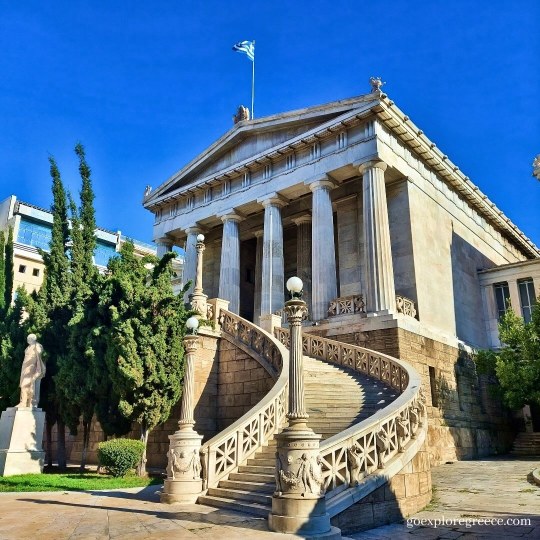
Step inside the grand halls of the National Library of Athens (Vallianeio Megaron) on Panepistimiou Street and discover a treasure trove of knowledge and history. This stunning building, built in the 19th century, used to be home to millions of books, manuscripts, and historical documents that span centuries of Greek culture and civilization.
As soon as you enter the building, you will be greeted by the grand marble staircase that leads to the main reading room. The high ceilings, ornate details, and natural light make it the perfect spot to sit and study or simply take in the beauty of the space. The main reading room is also home to a stunning fresco depicting the nine muses, the goddesses of the arts and sciences in ancient Greece.
But the National Library of Athens is not just a feast for the eyes. It still holds an incredible collection of books and manuscripts. The library's collection is a testament to the country's rich cultural heritage from ancient Greek texts to modern literature. It also houses a vast collection of maps, photographs, and other historical documents, making it a valuable resource for researchers and history enthusiasts.
#greece#goexploregreece#travel#mustsee#mustvisit#greek#europe#athens#athens city#public libraries#library#history#my photos
96 notes
·
View notes
Text
Round 1: Poll 1
*Please Read*
I advise everyone to read each contestant's story to get a well-rounded understanding of each entry. I urge you to not just vote for the one "you know best". I have everyone's stories/reasons why they should win under the cut.

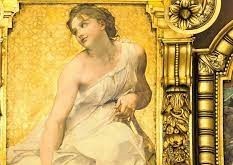
Propaganda:
Melia
What's The Love Story?
A little context of Ancient Greek culture is needed real quick.
In Ancient Greece, women were considered the “property” of their father, eldest brother, or husband. In the case of Melia, her myth says that Apollo kidnapped her - which brings the question of why was she submitted if it’s kidnapping?
Well. Remember the whole “women are property of dad/brother/husband” thing? While reading her myth, it sounds a lot like Melia ran away with Apollo — without her father, Oceanus’s, permission. Meaning, technically Apollo did “kidnap” her, since he didn’t get Oceanus’s “permission” to do so. Melia’s story is like that of Cyrene’s — texts say that Apollo also kidnapped Cyrene, but in reality she eloped with him without her dad’s say-so.
Melia and Apollo were eventually found in Thebes by her brother. When he couldn’t get her back, her brother set fire to Apollo’s temple, and Apollo shot him in response.
Melia also became a major cult figure in Thebes! And he basically made her one of The Most Important Deities in Thebes!
Why Should They Win?
Apollo malewifed her just like he malewifed Cyrene :)
Kids?
One for sure! Tenerus was a hero of Thebes and a prophet. Other accounts also list Ismenus (a river god) as her and Apollo’s son, but others also list him as another brother of hers so… *shrugs* who knows?
Terpsichore
What's The Love Story?
Terpsichore is one of the Nine Muses, and all of them have dated Apollo at one point - as a matter of fact, they probably all still are :D She and Apollo probably dance together a lot and learn new dances as they pop up!
Why Should They Win?
Poly rights
18 notes
·
View notes
Note
Hi! I was wondering if you happened to know any good resources, or places to find resources, for information on the muses? especially clio.. i've looked in a few places but cant find much.
hope youre having a wonderful day :D
Hello, Nonny, and thank you for the ask!
I had to ask a friend for some resources because I don't personally know very much about the Muses (although I probably should ^^;). My friend said they weren't able to find any books on the Muses so far, unfortunately, but here are some links they found!
-
Theoi.com - basic info can be found here; you can also look at what books they got their info from at the bottom, which could help in finding other resources to look into!
HistoryCooperative.org - my friend says they are brief but helpful
WorldHistory.org - again, brief but helpful
Wikipedia.org - may not seem trustworthy at first glance, but Wikipedia can be quite helpful
-
When looking specifically for Clio, Theoi should have a separate page written about her right here. Wikipedia also has some good information in their annotations, my friend says.
-
Regarding some book recommendations, my friend has not read these but has heard good things about The Nine Muses: A Mythological Path to Creativity by Angeles Arrien as well as Muses at Work: Arts, Crafts, and Professions in Ancient Greece and Rome by Carl Roebuck.
-
I hope these resources are helpful to you! If anyone has anything to contribute, please do, and I'll try to reblog your addition. Have a good day/night, and take care! 🧡☺️
20 notes
·
View notes
Text
How many Muses?
Given my Greek mythology posts have been sparking some interest lately, I thought: why not bring more to my fellow Greek mythology fans? And so today, what I want to talk about is, the Muses.
A lot of people only know them through the Disney movie “Hercules” - and... of course, you know how faithful to Greek mythology this movie is *cough cough* irony *cough cough*. They did get some things quite right - such as putting the Muses as narrator of the story, that’s a nice and intelligent move. And then... there’s the rest. But let’s put all that aside and take a look at who were truly the Muses.
Note: Muse is the modern, Latinized spelling and saying of the goddesses’ name. In original Ancient Greek, it is “Mousai” (Mousa in singular) (in Latin, “Musa, Musae”).
I) Homeric vs Hesiodic ; and the nine Classical Muses
As usual, what one needs to first do, when looking at a Greek deity, is compare the Homeric and Hesiodic traditions.
Homer, in his Iliad and Odyssey, describes the Muses as the daughters of Zeus. He usually talks of them in plural, and even at one point says there are nine Muses in total - but in other passages of his epic he refers to the Muse, in singular, and treats her as a singular goddess (we’ll come back to this afterward). The Muses are described as singers and music-providers for Olympus, other gods, and half-gods of note. For example they are known to be the one singing alongside Apollo’s music during the divine feasts on Olympos, and when Achilles dies, they are the ones who sing at his funeral. This insistance on the Muses being singing-goddesses is notably carried on by an anecdote Homer tells in The Iliad: it is said that a Thracian man named Thamyris pretended that he was a better singer than the Muses, and could beat them at a singing contest with ease. The Muses heard of his boasting, and angry with him, threw a violent curse at him, removing his beautiful voice AND making him unable to remember any song (or rather turning him into a “singer without memory”). Again, this is an example of the topic of “hubris punished” in Greek mythology: the gods cannot reach the same levels as the gods, as if they pretend they are better than them, they’ll lose everything. If this man had just been happy with his voice and said he was the better singer of all humankind, he wouldn’t have attracted the fury of the Muses - but he had to boast he was better than the “official” singers of the gods...
But beyond singing, Homer also heavily points out that the goddesses are deities of poetry. In the Iliad and the Odyssey, it is made very clear that the bards of Ancient Greece - the aoidoi (insulgar aoidos) - are considered the main servants of the Muse. To be a talented poet, or a talented bard, or even a gifted singer, you must receive the favors and blessing of the Muse, because it is her that offers as much poetic/singing talent as inspiration, to create songs, poems and stories. I keep saying “Muse”, singular, because in the texts of Homer, while the Muses are mostly referred to in plural as characters of the stories (at the feast of the gods, at Achilles’ funeral), whenever they are invoked as the patron of the aoidos, or when Homer himself invokes them, the singular “Muse” is used. Does Homer refer to one specific Muse among the nine, or does he unites and gather all nine goddesses into one singular deity? It is unclear. But what stays is Homer’s famous, iconic lines - his call to the Muse before beginning each of his epic, his plea for her to give him the story he needs to tell, and his thanks for her revealing to him all the secrets of the gods. Because, in these early times of Ancient Greece, the great epics and the great poems were seen as being “offered” by the gods to humanity. Poetic inspiration and poetic talent came from the gods - from the Muses to be exact - and as a result, all those great stories sung by the bards, all the myths and legends of the poets, were offered by the all-knowing Muses to humankind. Without the Muse, a poet, writer, storyteller loses as much his voice as his memory (as the story of Thamyris proves). And this is why Homer invokes the Muse and her blessing before beginning each of his epics.
(And as with providing music for the gods, Apollo also co-worked alongside the Muses when it came to teach humans how to sing and poets which story they should tell)
Now, if we go by the side of Hesiod, we do not have a contradiction (unlike with other deities). Hesiod confirms that all singers, all musicians, all poets own their talents, inspiration and gifts to the Muses and Apollo - without them, there wouldn’t be any form of art on earth. The job of the “servants of the goddesses” is to sing the great deeds of the most valorous and heroic men, and the stories and adventures of the immortal gods - and in doing so, they make people forget their troubles and sorrows... This is the nature of the service of the Muses, according to Hesiod, distract and entertain humanity not in a goal of information, but to ease the hard and difficult life of mortals. The same way Homer called upon the Muse before beginning each of his poem, and regularly asked her to “give” him the stories he was about to sing, Hesiod claims in his Theogony that all he is about to reveal was actually taught to him by the Muses, who appeared to him one day as he was on Mount Helicon. They selected Hesiod, a mere shepherd, a base man part of the lower class of Ancient Greece, and turned him into a glorious poet, into the honored and blessed servant of the gods supposed to tell their deeds for all of eternity. Though, Hesiod slides a very interesting remark in his poem... He mentions that when the Muses appeared to him, they specified that they know many true things that they tell humans... as much as they tell them false things, but worded with such talent and cunning that they appear as they are true. This mention is highly interesting: in the Homeric tradition, the Muses are all-knowledgeable because they are goddesses, and they assisted to most of the events they tell, so there is no doubt that what the goddesses bring to aoidoi are true. However, in Hesiod there is more ambiguity, as the Muses admit they are, just like poets, as much carriers of truth as bringers of lies that are so convincing they appear to be true. [There could be a whole debate on how Ancient Greeks perceived poetry, myths, and all that, but let’s keep things simple].
What Hesiod brings to the table is a lot of additional information that Homer does not give. For example he precises that, beyond Olympos (where they dwell by the side of Zeus, delighting their father with all sorts of stories of the present, the past and the future), they also dwell on the mountain Helikon (the place where Hesiod met them). On this mount, they can be seen dancing, and taking baths in springs, and at night, “veiled with mist”, they sing and praise all of the gods, from Zeus, Hera, Athena and Apollo to Gaia, Okeanos, Selene, Helios, - and many, many more. Hesiod more interestingly specifies the identity and ligneage of the Muses: he explains that they were born of Zeus and of the goddess Mnemosyne, the personification of Memory. It is said that Zeus laid down with Mnemosyne for nine consecutive nights, and that one year afterward the Muses were born, nine daughters “of one mind”, who immediately started singing with their sweet and lovely voices, and quickly went to their father Zeus, at the top of Olympos, where they still dwell to this day. Hesiod also gives each of the nine Muses an individual name: Clio, Euterpe, Thalia, Melpomene, Terpsychore, Erato, Polymnia, Ourania and Calliope.
What is quite interesting is that, in Classical Greece, a consensus and appreciation grew, in literature, poetry, philosophy and culture, that each of the nine Muses represented a different form of art - for each goddess was a specific domain, which would explain why Homer only called upon one specific Muse to sing his poems, since epic poetry would be the domain of one given Muse. This is the list and classification that is the most well-known and widespread today. But, it is present neither in Homer nor in Hesiod. In Homer the goddesses are an unnamed group, and while Hesiod gives them personal identities, he only identifies one division: between Calliope and his sisters. Indeed, Hesiod claims that Calliope is the greatest of the Muse and the leader of the nine, because her domain is to give inspiration and talent to the princes (nobility, royalty, top of the hierarchy). A bit like fairy godmothers, the Muses can take a fancy to a lovely princely baby, and upon his birth place some��“sweet dew” upon his tongue, so that his words would be gracious, his judgements always true, his speech sure and his mind wise. And it is watching over those Muse-gifted princes that is Calliope’s job.
Now, I won’t go into great details into this matter more, but here is the “classical” list everybody knows today and that became with time the “traditional” and “by default” categorization of the Muses. Calliope is the Muse of epic poetry (the one that Hesiod and Homer sings, so when Homer calls upon the Muse, he calls upon Calliope). Thalia is the muse of another form of poetry, pastoral poetry, as well as the muse of the genre of the comedy (in theater, because theater is a form of poetry for the Ancient Greeks). She is opposed by Melpomene, who is the Muse of tragedy. Erato is the muse of love poems and lyric poetry as a whole, where Polymnia is the Muse of hymns, sacred poetry and religious songs. Euterpe is the Muse of music (especially flute music), while Terpsichore oversees dancing. And then come two Muses that can surprise someone today because these are thought to be science, not arts, but in Ancient Greece these domains were considered forms of art: Clio, the Muse of historians, and Ourania, the Muse of astronomers.
II) Not nine? The alternate Muses
A text is often brought up when one starts digging into the Muses. A text by Diodorus Siculus: his “Library of History”, written in the 1st century BC (so a VEEERRRYYY long time after Homer and Hesiod). As the title of the text says, it is the work of a historian trying to trace back the origins of the myths, and Diodorus take an interest in the Muses because of their association with Dionysos (this is a novelty of the late centuries of Ancient Greece - apparently the Muses had gained a new connection to the god Dionysos, when before they were just associated with Zeus and Apollo, and Diodorus even says they were paired with satyrs out of all creatures, the satyrs providing the music by instruments while the Muses sang and dance.
Diodorus presents the tradition we best know today: the Muses are nine, and the daughters of Zeus and Mnemosyne. But he also lists several alternative presents in the work of other poets, and that he believes never took off because of how prevalent and dominant Hesiod and Homer’s work were on the myth of the Muses. He notably says that some poets give the Muses a different set of parents: they become more “primordial” deities by becoming the daughters of Gaia, the Earth personified, and Ouranos, the Sky personified - which would make them sisters of the Titans. He also adds that before Hesiod and Homer made the number nine popular for the Muses, there were only three of them. Other details he mentions that were present in his time but not in Hesiod or Homer’s texts are that 1) The Muses apparently discovered letters, and how to arrange them to form words, creating the first poem by doing so. 2) The Muses are eternal virgins - because, as Diodorus suggests, it furthers the allegory of a “pure and uncontaminated education” to reach the peeks of poetry. Though again, in Homer and Hesiod no mention of virginity, discovering letters or hanging out with satyrs. In fact it is quite bizarre to have virgin goddesses partying with satyrs... But by the 1st century BC things had grown very bizarre in Greek mythology. Even weirder of course is the fact that in older texts and legends, Muses were clearly not virgins as Calliope for example was renowned as the mother of Orpheus... It seems the whole “virgin” thing was a very late addition to the myth - as Diodorus says, it seems to mostly exist as an allegory for the “purity of the art” or whatever.
What is very interesting here is the mention that “Before they were nine, they were three...”. It is a topic that has been getting some interests today: the “original trinity” of Muses. At this point things however get a bit complicated and broken down... For example Pausanias, in the second century AD (so long after Diodorus himself), in his “Description of Greece”, claims that the Aloades, Ephialtes and Otos, were the first to honor and sacrifice to the Muses, on the Mount Helikon, and that when they started the cult of the Muses, there were three of these goddesses: Melete, the personification of practice, Mneme, personification of memory, and Aoede, personification of songs. Pausanias however claims that afterward, the original three Muses were changed into the nine we know today. He also mentions an obscure poet of the 6th century BC, Mimnermos, who claimed there were two sets of Muses: an “older” group, born of Ouranos, and a “younger” group daughters of Zeus (and we know by other sources that Mimnermos, like other poets such as Alcman, poets of the 6th or 7th BC century, was one of those poets that attributed the birth of the Muses to Gaia and Ouranos... So from these informations, it seems the Muses were originally three goddesses born of Ouranos and Gaia, elderly deities representing the three parts of art (practicing, memorizing and then singing/performing), but that with time they were “de-volved” into daughters of Zeus, and nine personifications of different types of art.
It is a quite simple and interesting concept... if it wasn’t for other little tidbits that complicate the matter further. For example there are fragments and information about another obscure poet of the 7th or even 8th century BC, from Corinth, who also listed the Muses as three... but as the daughters of Apollo, with different names from the ones listed above, and who were co-worshipped alongside their father at the Delphi sanctuary (you know, Delphoi, where Apollo had his main oracle). The Apollo symbolism seems reinforced by the fact that, according to some sources, these three Muses were named after the three chords of the lyre, the sacred instrument of Apollo: Nete, Mese and Hypate. This was not however their only set of names: the obscure poet I talked above rather gave them the names Cephisso, Apollonis and Borysthenis. Overall it makes sense that in some areas they would be seen as the daughters of Apollo, given how strongly they are associated with him, sharing most of their domains and activities with the god: in fact, one of Apollo’s epithet was “Muse-Leader”, Apollo Mousegetes.
So... it seems yes there might have been originally three Muses - but the idea of these Muses as sisters of the Titans and a primordial trinity of art goddesses was not the only one prevalent in Greece. In Apollo dominated area, they were his daughters and personifications of the music of the lyre.
It is quite poetic however that we still keep the importance of the number three by having still three different sets of Ancient Greek Muses today - the daughters of Zeus, the daughters of Ouranos and the daughters of Apollo. (I know there is a fourth set about four different Muses - but given it was written by Cicero and is part of Roman literature I will gently push them aside, because we focus on Greek things here).
EDIT: I forgot to mention the Homeric Hymns! I didn’t want to put them alongside Homer’s “certified” work like the Iliad of the Odyssey, since too many people make the mistake the Homeric Hymns are authored by Homer “for sure”... Anyway, to add some more info, in the Homeric Hymn to Artemis, it is mentioned that the Muses dance with the Charites at the house of Apollo, at Delphi, and that sometimes Artemis joins to “order” and “lead” the dance. The Homeric Hymn to Apollo however rather presents them, in their “usual” setting, as singing hymns in the “house of Zeus” at the top of mount Olympos (though their song isn’t just about the glory and gifts of the immortals, it also apparently involves describing the suffering, weakness, helplessness and misery of humankind...). Finally, in the Homeric Hymn to Hermes Apollo describes himself not as a master or leader interestingly, but as a “follower” of the Muses of Olympus.
22 notes
·
View notes
Text




Who else loves stories? I know I do! Besides the beautiful suits, I was drawn to Shining Nikki because of the lore. It's so rich and captivating!
So, I wanted to share some fun facts about stories that I like:
-One of the oldest - if not the oldest - Cinderella stories is a Chinese tale called "Ye Xian" (pronounced "yeh-shen"), and it dates back around 2,200 years ago. Here are a couple versions to look at.
-(Minor arachnophobia for this one) Anansi is from Ashanti/Akan folklore, and he is the spider-god of tricks and storytelling. I like this video here about him. Make sure to turn on the Closed Captions!
-In Ancient Greece, the main goddess of storytelling was Mnemosyne (pronounced "ne-MOH-sinee"), and her daughters were the Nine Muses of the arts and music. While Disney only included five of the Muses, this is still a fun song as they tell the story of Zeus and the Titans.
8 notes
·
View notes
Text
Greek Mythology
I love how every Greek mythos starts with
"Once upon a time Zeus was a teensy tiny bit horny"
#greek gods#greek mythology#fuck zeus#greek god#zeus#hera#aphrodite#hephaestus#ares#dionysos#nine muses#hermes#hestia#athena#artemis#greek myths#percy jackson#ancient greece#ancient rome#uquizzes#dionysus
35 notes
·
View notes
Text
Greek Mythology in Twisted Wonderland: Book 6 Part 2
hey hi hello once again! i am back to annoy and educate you in one of my weird niches once again. i already did a deep analysis in part 2 so if you want you can check it out there. otherwise, i'll most likely repeat myself unless otherwise. everything will be under the read more cause this will be long once again.
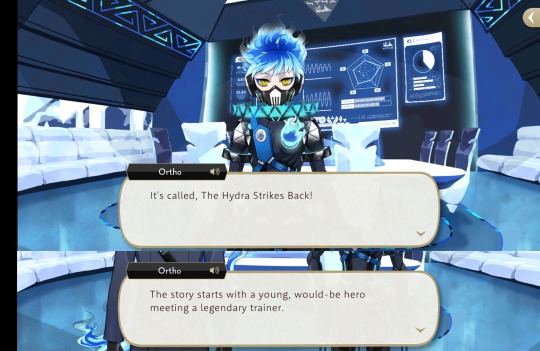
starting off strong, we got the hydras! as many know, the hydra is a nine headed serpent where if one's head is chopped off, another will grow in its place. it was mentioned as one of the labors from the twelve labors of heracles. it was the second labor that heracles has to tackle, the first being the nemean lion. i know in the movie, hercules would chop off the heads because he's stupid, but heracles was very smart and would find a way to lure the hydra out of its poisonous caves to attack it.
also should mention, its spit was also poisonous. i know in the movie hercules gets swallowed and thus allowed him to kill the hydra. yeah, the poison would've killed him. instead, he requested the assistance of his nephew to help defeat the hydra. with the assistance of athena, heracles would chop off the heads of the hydra while his nephew would cauterize the stump, thus defeating the creature.
another fun fact, hera was getting pissed that heracles was winning, so she sent a crab after him in the hopes of getting distracted. unfortunately, heracles would later step on it, not even be bothered by the crab. hera felt bad for her crustacean friend so she allowed the crab to be among the stars, and that's where the star sign cancer comes from.
reference

tbh i first thought it was talking about zeus, but reading further it was talking about heracles. or at least the hercules from the movie because i can guarantee you, heracles very much knew who his father was. he was also not a god, his parents were zeus and a mortal woman where the name escapes me.
gaia is the titan goddess of the earth and the grandmother of the olympic gods. i don't know what titan nebula god idia is talking about because it's not really well known. the only one i could definitively find was astraeus, who is the titan god of the stars and planets and the art of astrology. in some cases, he was also the father of the stars and the four seasonal winds. otherwise, there's not much knowledge of him.

mnemosyne is the titan goddess of memories and is the mother of the nine muses, with zeus being the father. i've mentioned it before in my previous post, but zeus would have sex with anything and anyone. he was not a good guy.
anyway, i digress. mnemosyne was also a river in the underworld, which ran parallel with the river lethe, the river of forgetfulness. according to myth, souls who are reincarnated would drink from the river lethe so they would forget their past life. however, souls of the novices would be told to drink from mnemosyne. possibly so they could remember their past life, i'm not clear on the details.
reference

aegis is mostly cloth that ancient greece has used. it was mentioned that athena has adopted the aegis as regular dress, even going so far as to use the severed head of medusa as a symbolic representation.
tbh, i would think they would use argus, who in greek mythology was a creature with many eyes around its body. he was mentioned as being a servant to hera. in one myth, hera was able to capture one of zeus's lovers (i think it was io it's been a while) who was turned into a cow and was kept in hera's garden. argus was stationed to keep watch, since his eyes would always be open. zeus devised a plan to rescue his lover by having him slain. he asked hermes for help, which he disguised himself as a shepherd and played a song to put all the eyes of argus to sleep. after he was sure he was asleep, hermes slaughtered argus by using a stone to hit him over the head.
i just think it would've been fun if the barrier was called argus. it would've been a fun flavor point.
reference

lachesis, clotho, and atropos are the three moirai, or the fates, and they would assign individual destinies to mortals at birth. clotho was the spinner, which means she was in charge of the thread. lachesis was the allotter, which meant that she would distribute the mortal's fate. and lastely atropos the inflexible, which meant that she would not compromise someone's fate no matter how much they begged. one would spin the thread, another would measure it, and the third one cuts it. in some myths, they were the daughters of nyx, the goddess and personification of night. they had enormous power and even zeus was unable to recall their decisions.
reference
fun fact, this isn't the first time they were mentioned.

they were mentioned throughout the entire game, but the more memorable one is during jamil's fairy gala vignette. no one really knows how old the fates are. they can either be really old or really young, depending on certain myths. also it's fun flavor points when the threads of fate are mentioned.
one more fun fact, the moirai sometimes gets confused with the gray sisters. in the movie hercules, disney combined the gray sisters with the moirai for some reason. the gray sisters, who were extremely old women that shared one eye and one tooth, only showed up once in mythology and that was to give directions to perseus to find the gorgon medusa. the gray sisters at first refused until perseus took their eye and tooth and threatened to tell him where she was, which they agreed. the moirai were perfectly in tact and didn't need to share an eyeball. or a tooth.

yes but also no. i think i've mentioned this before, but the titans do predate the olympic gods, but they weren't the original gods. they were the twelve original children from the primordial parents uranus (the god of the sky) and gaia (the goddess of the earth). it would've been really cool to see the primordial gods that even predate the titans, but disney is trying to tie it into the movies and therefore hates fun.

a cool mention of zeus's lightning bolt. i should mention that it was just a literal lightning bolt, not a thunder spear. nevertheless, it's a cool image to think of.
i should also point out that zeus did not single handedly seal the titans away. i mentioned it in my previous post, but zeus did have assistance from other gods and creatures to defeat the titans.
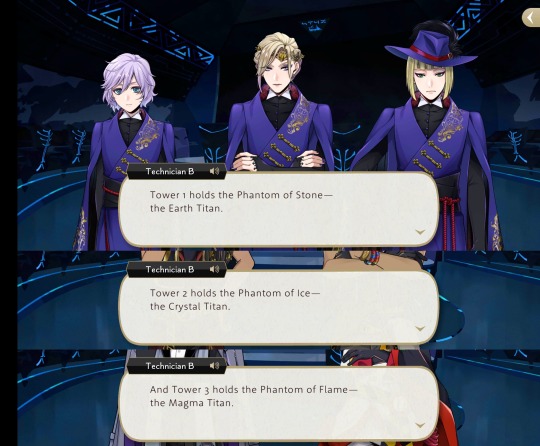
i get they're trying to connect it to the movie, but it would've been really fun to see the primordial gods in action. or at least be consistent with the actual titans. the only titan i can possibly think of that's the earth titan is maybe gaia, who is the goddess of the earth and is not a titan. the closest one of the phantom titans can come close to is coeus, who is the titan of inquisitive minds and intellect and the titan of the north, can be tied to the ice titan and maybe the magma titan can be tied to perses, the god of destruction. otherwise, there really isn't any correlation from these titans to the greek myth titans.
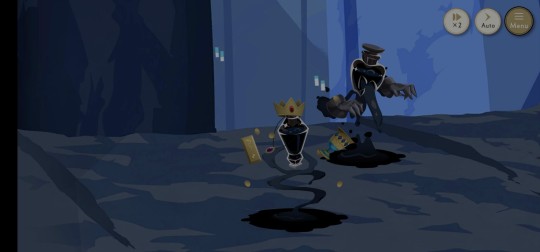
i think some of the phantoms are supposed to be nods to the disney movies. this one, however, i think is a nod to mythology. it's very similar to king midas, who as many know is a king who was able to turn anything he touched to solid gold. it was a blessing and a curse, as he accidentally turned his favored daughter into pure solid gold. he didn't have any correlation to hades, but this is mainly just for fun.
now i'm gonna just write it out because i either forgot to screencap it or i just didn't think it was necessary. idia mentions that no mortals can enter the gates to the underworld, which is somewhat true. there have been stories where mortals will enter into the underworld to reclaim their lost loved ones, such as the story of orpheus and eurydice. it's not uncommon, but it is rare for mortals to go into the underworld unless they're already dead.
the gates of the underworld is an interesting unique magic to have. mostly because of how media portrays it. rick riordan does a good job in depicting the gate to the underworld as being a door that's heavily guarded so no monsters or undead can enter through it. i believe thanatos guards it in the books, but my memory is hazy so forgive me.
i forgot to screen cap this part, but during idia's backstory when he recreated ortho, he mentioned about the hero going to the underworld to save his lover. this does happen occasionally, as i mentioned orpheus and eurydice. (tbh i legit thought idia was talking about them but then i remembered it was a movie tie in so whoops.) heracles does go into the underworld to retrieve a wife, but it wasn't his wife megara (extremely complicated and not going to get into the details. if you're curious, you can ask me and i will infodump.), but a wife of one of the kings that was one of heracle's friends. back in the day, the gods would take pity on mortals and would revive their lovers back from the dead. i don't think there's one for siblings, and i kinda feel bad for idia to hope that a god will revive his brother back to him.
what is pretty cool about the chapter titles is that each word at the end of the sentence rhymed. i don't remember if the other books had that, but it's pretty neat and it reminds me a lot of how greek plays, especially the chorus, would rhyme out loud during their performance. it was a nice nod to the greek and roman plays. (i studied them in college. it was an interesting experience.)
one thing i will critique is that i wished the towers were done a bit differently. in the underworld, there are three tiers within the underworld: asphodel, elysium, and the fields of mourning. it would've been really cool to see different landscapes that doesn't look so... stale? the technology part of it is pretty neat to look at, but seeing a lush meadow and experiencing a different side to the underworld would've been really cool to see. however, i understand budget issues and all that, but it still would've been nice to see.
and that's it! i might have missed some things, but it's already getting long. longer than the first one i think. if you want any clarifications or you want me to delve deeper into a myth i mentioned in passing, feel free to ask me and i'll do into much more detail as i possibly can. otherwise, hopefully everyone enjoyed the book and everyone enjoyed my little rants and explanations.
#twisted wonderland#twst#book 6 spoilers#book 6#i went on a very long rant on greek mythos but it was fun nonetheless#holy shit did this book take so long to complete
12 notes
·
View notes
Text
Day Two - Apollo

Apollo is arguably one of the most complex gods of Greek mythology. He is the god of many things, such as; the sun, archery, music, poetry, art, medicine, plagues, knowledge, light, and oracles.
His father is Zeus and his mother is a titan named Leto. He also has an older twin sister named Artemis. He was born on the Greek island of Delos.
Apollo was the leader of the nine muses (more on that coming in a later post!), and he directed their choir, hence being the god of music and art. He was also the epitome of male beauty in ancient Greece.
Hermes created the lyre and gave it to Apollo, and the lyre can be seen as a symbol of Apollo. He is often depicted with the lyre. Hymns to Apollo were called paeans.
Apollo has many lovers, resulting in many offspring. His children were scattered across the world. Majority his children inherited his beauty and also his skill from the many domains he has.
Apollo also brought the art of healing and medicine to the mortals. He is often referred to as The Healer, God of Truth, and God of Light.
Due to his extreme truthfulness he was granted the gift of fortune telling, which he also brought to man such as oracles.
Apollo also conquered and killed a serpent named Python, which he shot with a single arrow. He also played a major part in the Trojan War.
Animals:
Dolphin
Swan
Python
Raven
Wolf
Symbols:
Lyre
Laurel tree
Bow and arrow
Offerings:
Wine
Herbal tea
Sun water
Lamb
Archery
Poems
Paintings
Colours:
Red
White
Gold
Violet
Yellow
Orange
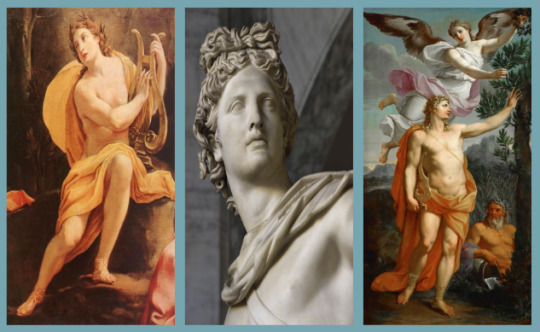
10 notes
·
View notes